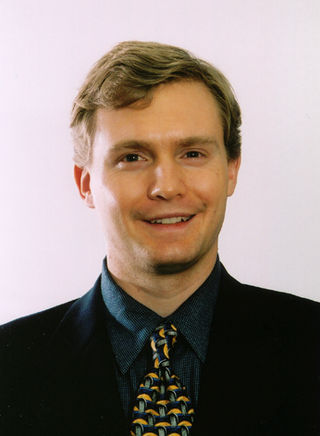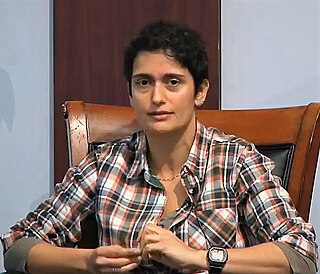
The University of California, San Francisco (UCSF) is a public land-grant research university in San Francisco, California. It is part of the University of California system and is dedicated entirely to health science and life science. It conducts research and teaching in medical and biological sciences.

The Global Fund to Fight AIDS, Tuberculosis and Malaria is an international financing and partnership organization that aims to "attract, leverage and invest additional resources to end the epidemics of HIV/AIDS, tuberculosis and malaria to support attainment of the Sustainable Development Goals established by the United Nations". This multistakeholder international organization maintains its secretariat in Geneva, Switzerland. The organization began operations in January 2002. Microsoft founder Bill Gates was one of the first donors to provide seed money for the partnership. From January 2006 it has benefited from certain US Privileges, Exemptions, and Immunities under executive order 13395, which conferred International Organizations Immunities Act status on it.
Africa Fighting Malaria (AFM) was an NGO based in Washington D.C., United States and South Africa which stated that it "seeks to educate people about the scourge of Malaria and the political economy of malaria control". The organization generally "promotes market based solutions and economic freedom as the best ways to ensure improved welfare and longer life expectancy in poor countries", according to their financial statement. Founded in 2000 during the Stockholm Negotiations on Persistent Organic Pollutants, AFM's original focus was the promotion of a public health exemption for the insecticide DDT for malaria control. According to their website, last updated in 2011, their mission was to "make malaria control more transparent, responsive and effective by holding public institutions accountable for funding and implementing effective, integrated and country-driven malaria control policies."

Amir Attaran is a Canadian professor in both the Faculty of Law and the School of Epidemiology, Public Health and Community Medicine at the University of Ottawa.

Mark R. Dybul is an American diplomat, physician and medical researcher. He served as the executive director of the Global Fund to Fight AIDS, Tuberculosis and Malaria from 2012 until 2017. Since 2021, he has been the CEO of Renovaro Biosciences. Since 2022, he is the Executive Chairman of Purpose Life Sciences.

William Raymond Steiger is a Public Policy Fellow at the Wilson Center in Washington, D.C.. He served as Chief of Staff at the United States Agency for international Development from 2017 to 2021. Previously, Steiger was the chief program officer at Pink Ribbon Red Ribbon, an organization affiliated with the George W. Bush Institute, which works to reduce deaths from cervical cancer and breast cancer in low- and middle-income countries. He was the Special Assistant to the Secretary for International Affairs and the Director of the Office of Global Health Affairs at the U.S. Department of Health and Human Services (DHHS) during the George W. Bush administration, with a portfolio that included HIV/AIDS, malaria, avian flu and pandemic-influenza preparedness.

Awa Marie Coll-Seck is as Senegalese infectious diseases specialist and politician who served as Minister of Health of Senegal from 2001 to 2003 and again from 2012 to 2017. She also served as former Executive Director of the Roll Back Malaria Partnership and is on the board of directors of several notable global health organizations. She is an agenda contributor of the World Economic Forum.

Eric Goosby is an American public health official, currently serving as Professor of Medicine and Director of the Center for Global Health Delivery, Diplomacy and Economics, Institute for Global Health Sciences at University of California, San Francisco. Dr. Goosby previously served as the UN Special Envoy on Tuberculosis as well as previously served as the United States Global AIDS Coordinator from 2009 until mid-November 2013. In the role, Goosby directed the U.S. strategy for addressing HIV around the world and led President Obama's implementation of the President's Emergency Plan for AIDS Relief (PEPFAR). Goosby was sworn in during June 2009 and resigned in November 2013, taking a position as a professor at UCSF, where he directs the Center for Global Health Delivery and Diplomacy, a collaboration between UCSF and the University of California, Berkeley.
Jack Chow is an American professor of public health. He holds the position of Distinguished Service Professor at Carnegie Mellon University Heinz College. Chow held a number of global public health offices including positions as the first Assistant Director-General of the World Health Organization on HIV/AIDS, Tuberculosis, and Malaria, Special Representative of the U.S. Secretary of State on Global HIV/AIDS and Deputy Assistant Secretary of State for Health and Science. This was a first - "first U.S. diplomat of ambassador rank appointed to a public health mission."

Agnes Binagwaho is a Rwandan Politician, pediatrician, co-founder and the former vice chancellor of the University of Global Health Equity (2017-2022). In 1996, she returned to Rwanda where she provided clinical care in the public sector as well as held many positions including the position of Permanent Secretary for the Ministry of Health of Rwanda from October 2008 until May 2011 and Minister of Health from May 2011 until July 2016. She has been a professor of global health delivery practice since 2016 and a professor of pediatrics since 2017 at the University of Global Health Equity. She has served the health sector in various high-level government positions. She resides in Kigali.

Michel Kazatchkine is a French physician, diplomat and advocate who is best known for his work in international AIDS treatment issues. From February 2007 to March 2012 he was director of The Global Fund to Fight AIDS, Tuberculosis and Malaria. On July 20, 2012, UN Secretary-General Ban Ki-moon appointed him as his United Nations Special Envoy for HIV/AIDS in Eastern Europe and Central Asia.
The UCSF School of Medicine is the medical school of the University of California, San Francisco and is located at the base of Mount Sutro on the Parnassus Heights campus in San Francisco, California. Founded in 1864 by Hugh Toland, it is the oldest medical school in California and in the western United States. U.S. News & World Report ranked the school fifth in research training and fifth in primary care training. Six members of the UCSF faculty have received the Nobel Prize in Physiology or Medicine and five have received the National Medal of Science.

Thomas J. Coates is the Director of the multi-campus University of California Global Health Institute, a UC-wide initiative established to improve health and reduce the burden of disease throughout the world. He is Professor Emeritus at the UCLA David Geffen School of Medicine and Founding Director of the UCLA Center for World Health, a joint initiative of the David Geffen School of Medicine at UCLA and UCLA Health, He has conducted extensive research in the realm of HIV and is the Michael and Sue Steinberg Endowed Professor of Global AIDS Research within the Division of Infectious Diseases at UCLA and Distinguished Professor of Medicine. Health-related behavior is of particular interest to Coates. Throughout his career as a health expert, his theory-based research has been focused on interventions aimed at reducing risks and threats to health
The Malaria Eradication Scientific Alliance (MESA) is an organization founded on the research carried out by the Malaria Eradication Research Agenda (malERA). "malERA" was a project carried out by the scientific community to identify the steps and future research that must be done in order to eradicate malaria. It was created after the Malaria Forum in 2007, hosted by the Bill and Melinda Gates Foundation, reestablished malaria eradication as a long-term goal. "malERA" first launched in 2008, and resulted in a research and development agenda which was published in a PLoS Medicine magazine in 2011. MESA was formed in 2012 to continue the goals of malERA through research and development of methods to fight malaria.
Dr. Winnie Mpanju-Shumbusho is a Tanzanian paediatrician and public health leader who until December 31, 2015, served as World Health Organization (WHO) Assistant Director General for HIV/AIDS, Tuberculosis, Malaria and Neglected Tropical Diseases based in Geneva, Switzerland. From 2016 to 2019, she served as board chair of RBM Partnership To End Malaria. Before joining WHO in 1999, Mpanju-Shumbusho was Director General of The East, Central and Southern African Health Community (ECSA-HC) formerly known as the Commonwealth Regional Health Community for East, Central and Southern Africa (CRHC-ECSA).
John S. Greenspan was an academic dentist/scientist and university administrator. His degrees and diplomas include BSc, BDS, Ph.D., FRCPath, FDSRCS (Eng). He was the Director-Emeritus of the AIDS Research Institute at the University of California, San Francisco (UCSF). He was also the founding Director of the UCSF AIDS Specimen Bank (1982-2017) and of the UCSF Oral AIDS Center (1986–2005).
Susan Kleppner Folkman is an American psychologist, author, and emerita professor of medicine at the University of California at San Francisco (UCSF). She is internationally recognized for her contributions to the field of psychological stress and coping. Her 1984 book Stress, Appraisal and Coping alongside Richard S. Lazarus, is the most widely cited academic book in its field, and the 17th most cited book in social science.

Kalipso Chalkidou is the Head of Health Finance at The Global Fund to Fight AIDS, Tuberculosis and Malaria and a Visiting Professor at Imperial College London. Previously she was Director of Global Health Policy at the Center for Global Development and Professor of Practice in Global Health at Imperial College London. Her research considers how local expertise can inform the allocation of scientific and healthcare resources.
Helen L. Smits was a health policy influencer and advocate in the United States, and lent her voice to several healthcare initiatives abroad. Most notably, she was a recipient of the Fulbright scholarship and served under the Carter and Clinton administrations. She also held positions in government organizations including the National Institutes of Health (NIH) and Healthcare Financing Administration.
Rifat Atun is a British physician and academic who, as of January 2024, serves as the Professor of Global Health Systems and Director of the Health System Innovation Lab at Harvard University. He is one of the most important figures in the contemporary study of comparative health systems and healthcare innovation and has made substantial contributions to health systems theory, health systems reform, and innovation in health systems.











